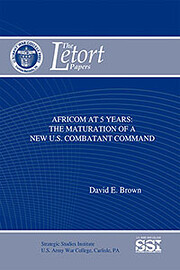

Pulse en una miniatura para ir a Google Books.
|
Cargando... AFRICOM at 5 Years: The Maturation of a New U.S. Combatant Commandpor David E. Brown
Ninguno Actualmente no hay Conversaciones sobre este libro. Ninguna reseña sin reseñas | añadir una reseña
The U.S. Africa Command (AFRICOM), newest of the six U.S. Department of Defense geographic combatant commands (CCMDs), was created in 2007 amid great controversy in both Africa and the United States over its location and mission. Over the last 5 years, AFRICOM has matured greatly, overcoming much of the initial resistance from African stakeholders through careful public messaging, and by addressing most of the U.S. interagency concerns about the Command's size and proper role within the U.S. national security/foreign policy community. This Letort Paper describes the geostrategic, operational, and intellectual changes that explain why AFRICOM was created, and debunks three myths about AFRICOM: that it was created to "exploit" Africa's oil and gas riches, "blocks" China's rise in Africa, and that France "opposes" AFRICOM. The author concludes by raising five issues that are important to AFRICOM's future: 1) allocated forces to carry out short-term training engagements in Africa; 2) preference to emerging democracies in the selection of the Command's partner-nations; 3) the desirability of regional approaches in Africa, including helping the African Union and its Regional Economic Communities to establish standby brigades; 4) the location of the Command's headquarters, which should remain in Stuttgart, Germany, for operational efficiency; and, 5) the need to carry out a top-down "right-sizing" exercise at AFRICOM during a time of severe budget constraints and a real risk for the United States of "strategic insolvency." No se han encontrado descripciones de biblioteca. |
Debates activosNinguno
 Google Books — Cargando... Google Books — Cargando...GénerosSin géneros Clasificación de la Biblioteca del CongresoValoraciónPromedio: No hay valoraciones.¿Eres tú?Conviértete en un Autor de LibraryThing. |
||||||||||||||||||||||||||||||||||||||||||||||||||||||||||||||||||||||||||||||||||||||||||||||||||||